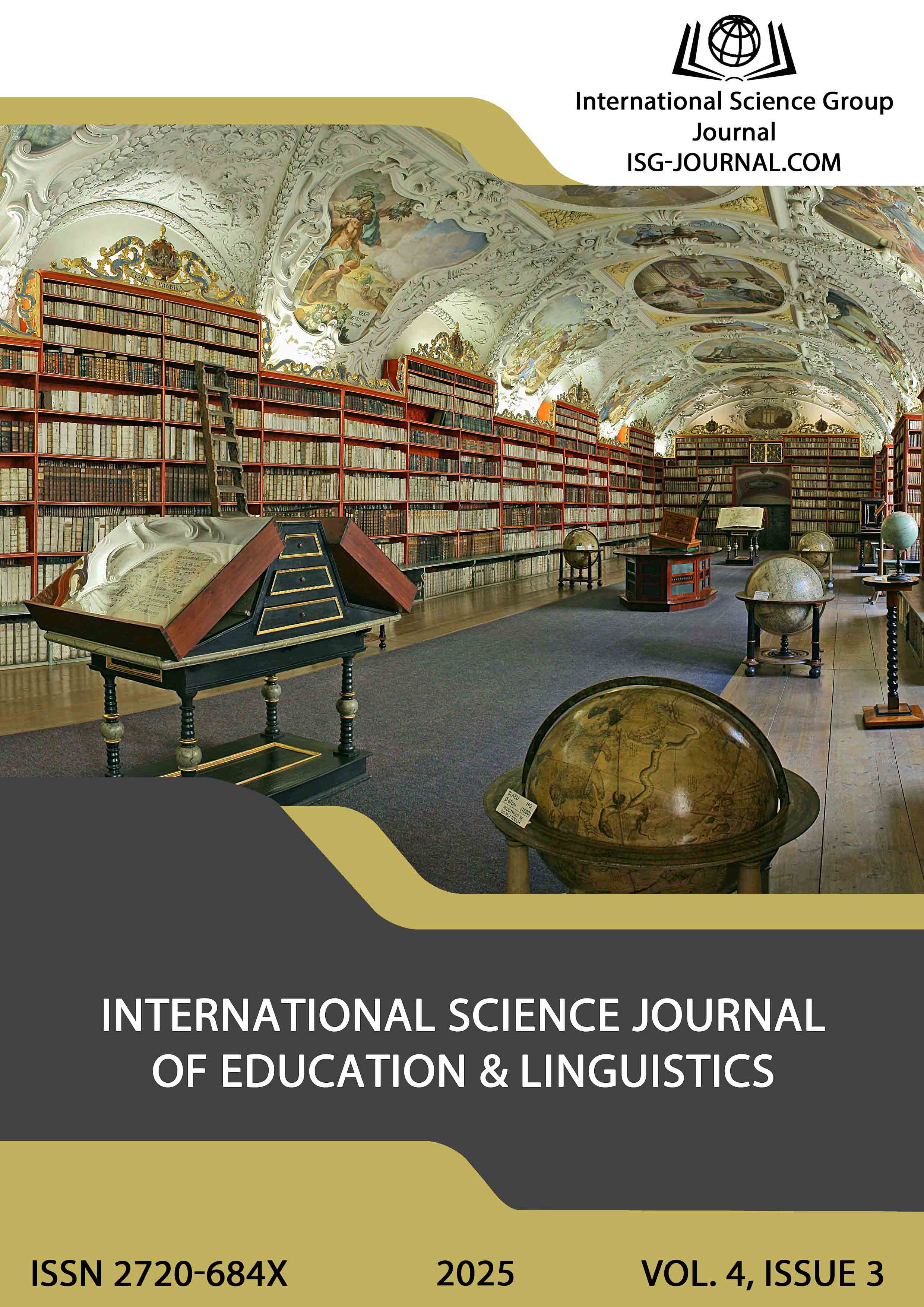The importance of hierarchy and classification of sciences in the educational process
DOI:
https://doi.org/10.46299/j.isjel.20250403.02Keywords:
classification of sciences, classification methodology, principle of hierarchy, structural and functional analysis, dynamic interference modelAbstract
The work is devoted to the current issue of a systemic nature. A positive attitude toward the need for the classification of sciences is justified. The arguments are the facts of the creative influence of the classification of sciences on: 1. Optimization of knowledge structuring. 2. A clearer identification of the specialization of sciences is needed. 3. Classification helps to see differences and connections between sciences. 4. Form the methodology of knowledge. 5. Forms the educational process. 6. Carries out synergism of scientific communications. 7. Potes the economic and managerial feasibility of structuring sciences. The work considers the task of substantiating a new modern methodology and reflecting the dynamics of the emergence of new scientific areas. Both structural-functional and hierarchical approaches are used. The subject of the study (subject) is the patterns of the emergence of new scientific areas in the modern world. The object of research is the possibility of logical and graphic interpretation of the formation of new scientific areas and their relationships. Models of a historical approach and classification of sciences in terms of fundamentalism and object of research are proposed. The trends of the 21st century, which should be taken into account by classifiers of science, are represented 1. Convergence of NBIC technologies: nano (material science), BIO (general engineering), info (quantum calculations). Cogno (neuro interfaces). 2. Revolutionary changes to the methodologists are presented: the fourth paradigm (given-oriented science): CERN: 30 petabytes/data year with a tank; Alphafold: prediction of 200 million protein structures. 3. The emergence of new disciplines: Cliodinomics: mathematical modelling of historical processes. Astrobiology: Search for life outside the Earth + synthetic biology. The forecast has been made that further studies should show that the real, relevant hierarchy of sciences should discard the image of the hierarchical staircase and take the form of a neural network with cross-bonds, where breakthroughs arise at the joints of the disciplines. With this approach, mathematics remains the “queen of sciences," but its power is now shared with science and complexity theory. A dynamic interference model is proposed to predict the development of new directions.References
Gieryn T.F. Cultural Boundaries of Science: Credibility on the Line, Contemporary Sociology. A Journal of Reviews 30(1). DOI:10.2307/2654345 https://www.researchgate.net/publication/37689534_Cultural_Boundaries_of_Science_Credibility_On_the_Line
Wolfgang Glänzel, Andras Schubert. A new classification scheme of science fields and subfields designed for scientometric evaluation purposes. Scientometrics, Vol. 56, No. 3 (2003) 357–367 Scientometrics · March 2003 DOI: 10.1023/A:1022378804087 · Source: RePEc
Gercina Angela de Lima, Benildes Coura Moreira dos Santos Maculan. Knowledge Universe: classification and categorization from the perspective of knowledge organization August 2024RDBCI Revista Digital de Biblioteconomia e Ciência da Informação 22 DOI:10.20396/rdbci.v22i00.8675419/en https://www.researchgate.net/publication/382973706_Knowledge_Universe_classification_and_categorization_from_the_perspective_of_knowledge_organization
Vincenzo Politi. Scientific revolutions, specialization and the discovery of the structure of DNA: toward a new picture of the development of the sciences May 2018Synthese 195(5) DOI:10.1007/s11229-017-1339-6 https://www.researchgate.net/publication/313959221_Scientific_revolutions_specialization_and_the_discovery_of_the_structure_of_DNA_toward_a_new_picture_of_the_development_of_the_sciences
Jian Qin, Frederick Wilfrid Lancaster, Bryce Allen. Types and Levels of Collaboration in Interdisciplinary Research in the Sciences October 1997Journal of the American Society for Information Science 48(10):893-916 DOI:10.1002/(SICI)1097-4571(199710)48:103.0.CO;2-X https://www.researchgate.net/publication/220433438_Types_and_Levels_of_Collaboration_in_Interdisciplinary_Research_in_the_Sciences
Nelius Boshoff .Types of knowledge in science-based practices August 2014Journal of Science Communication 13(03):A06 DOI:10.22323/2.13030206 https://www.researchgate.net/publication/264863964_Types_of_knowledge_in_science-based_practices
Leonid Griffen, Nadiia Ryzheva, Dmytro Nefodov, Lyudmila Hryashchevskaya. Historical stages in the formation of the scientific knowledge system in a theoretical and methodological context July 2021 Linguistics and Culture Review 5(S2):96-107 DOI:10.21744/lingcure.v5nS2.1333 https://www.researchgate.net/publication/355829823_Historical_stages_in_the_formation_of_the_scientific_knowledge_system_in_a_theoretical_and_methodological_context
Atik Kurniawati. Science Process Skills and Its Implementation in the Process of Science Learning Evaluation in Schools October 2021Journal of Science Education Research 5(2):16-20 DOI:10.21831/jser.v5i2.44269 https://www.researchgate.net/publication/355462765_Science_Process_Skills_and_Its_Implementation_in_the_Process_of_Science_Learning_Evaluation_in_Schools
Steven Cooke, Austin J Gallagher, Natalie M. Sopinka, Vivian M. Nguyen. Considerations for effective science communication. FACETS. March 20172(1) DOI:10.1139/facets-2016-0055 https://www.researchgate.net/publication/314299156_Considerations_for_effective_science_communication
Promise Chika Oparah. Feasibility Studies in Business Management. In book: Contemporary Issues in Business Management: A Multidisciplinary Approach (Book of Readings), - 2017. - pp.214 – 225. https://www.researchgate.net/publication/354463318_Feasibility_Studies_in_Business_Management
Hierarchy of the sciences. https://sociology.plus/courses/auguste-comte/lesson/hierarchy-of-the-sciences
Ralph Gomory Early Integer Programming. February 2002Operations Research 50(1):78-81. DOI:10.1287/opre.50.1.78.17793 https://www.researchgate.net/publication/220244043_Early_Integer_Programming
Auguste Comte French philosopher. Harry Elmer Barnes, Ronald Fletcher. Article History of Encyclopaedia Britannica. Last Updated: Feb 18, 2025. https://www.britannica.com/biography/Auguste-Comte
Universal Decimal Classification https://udcc.org/
Jens-Erik Mai. The modernity of classification. Journal of Documentation · July 2011Journal of Documentation Vol. 67 No. 4, 2011 pp. 710-730 DOI: 10.1108/00220411111145061 www.emeraldinsight.com/0022-0418.htm
Downloads
Published
How to Cite
Issue
Section
License
Copyright (c) 2025 Viktor Biryukov

This work is licensed under a Creative Commons Attribution 4.0 International License.





